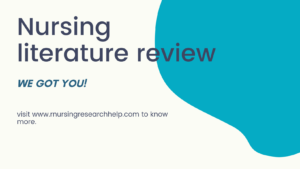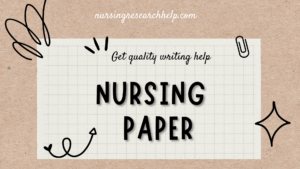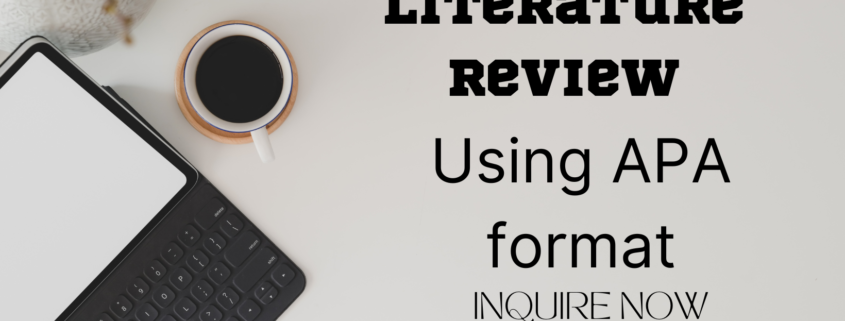Simplifying Nursing Literature Reviews: The Ultimate Step by Step Guide
Simplifying Nursing Literature Reviews: The Ultimate Step by Step Guide
In the realm of healthcare, nursing plays a critical role in promoting patient well-being and delivering quality care. As nurses strive to provide evidence-based practice, literature reviews serve as invaluable tools for gaining an in-depth understanding of existing research and its implications for nursing practice. In this blog post, we will explore the importance of nursing literature reviews, their purpose, and provide a step-by-step guide to conducting a comprehensive review.

1. Understanding the Purpose of a Literature Review in Nursing:
a) Identifying Gaps:
One of the primary purposes of a nursing literature review is to identify gaps in current knowledge. By examining existing research, nurses can identify areas where further investigation is needed, helping to guide the direction of future studies and research efforts.
b) Evidence-Based Practice:
Literature reviews are essential for evidence-based nursing practice. By synthesizing and analyzing existing evidence, nurses can make informed decisions about patient care and interventions. They can identify the most effective treatments and interventions based on the available evidence, enhancing the quality of care provided.
c) Identifying Best Practices:
Nursing literature reviews help identify best practices, interventions, and strategies that can enhance patient outcomes and improve healthcare delivery. By reviewing and analyzing a wide range of studies, nurses can determine which approaches have the most positive impact and can be applied to their own practice settings.
2. Steps to Conducting a Nursing Literature Review:
a) Define the Research Question:
Clearly defining the research question or topic of interest is crucial to conducting a focused literature review. This will provide a foundation for the review process and guide the search strategy.
b) Identify Relevant Databases:
To ensure a comprehensive review, it is important to identify and search relevant nursing and healthcare databases. Some commonly used databases include PubMed, CINAHL, and the Cochrane Library. These databases contain a wealth of nursing research articles and other related resources.
c) Develop Search Terms:
Developing a list of relevant keywords and search terms is essential for conducting an effective literature search. Consider using a combination of medical subject headings (MeSH terms) and text words to maximize the comprehensiveness of your search. This will help ensure that you capture all relevant studies related to your research question.
d) Conduct the Literature Search:
Execute your search strategy in the selected databases. Use Boolean operators (e.g., AND, OR) and truncation symbols (*) to refine and broaden your search as needed. It is crucial to document your search strategy to ensure transparency and replicability. Keeping a record of the databases searched, search terms used, and the number of articles retrieved will be helpful during the review process.
e) Screen and Select Articles:
Review the titles and abstracts of the retrieved articles to determine their relevance to your research question. Exclude articles that do not meet your inclusion criteria and select those that align with your topic of interest. This initial screening process will help narrow down the number of articles for further analysis.
f) Read and Analyze Selected Articles:
Thoroughly read and analyze the full-text articles that meet your inclusion criteria. Take notes, highlight key findings, and consider the study design, sample size, methodology, and other relevant aspects. It is important to critically evaluate the articles to determine their quality and applicability to your research question.
g) Extract Data:
Create a data extraction form to systematically record relevant information from each selected article. This may include study details, sample characteristics, interventions, outcomes, and any other data pertinent to your research question. Organizing the extracted data using tables, spreadsheets, or other visual tools can aid in data management and analysis.
h) Analyze and Synthesize the Findings:
Analyze the extracted data and identify common themes, trends, or patterns across the selected studies. Consider using a matrix or visual tools to facilitate data organization and comparison. Look for similarities and differences in study findings, interventions, and outcomes. By synthesizing the findings, you can gain a comprehensive overview of the current state of knowledge on your research question.
i) Critically Appraise the Literature:
Assessing the quality and validity of the included studies is an essential step in the literature review process. Utilize appropriate appraisal tools, such as the Joanna Briggs Institute (JBI) Critical Appraisal Checklist for Systematic Reviews or the Mixed Methods Appraisal Tool (MMAT), to evaluate the methodological rigor of each study. This critical appraisal will help determine the strength of the evidence presented in the literature.
j) Interpret and Report the Results:
Interpret the synthesized findings and present them in a coherent and organized manner. Provide a summary of the current state of knowledge, identify any gaps or inconsistencies, and discuss the implications for nursing practice and future research. Consider using visual aids such as tables, graphs, or flowcharts to enhance the presentation of your findings.

3. Tips for an Effective Nursing Literature Review:
a) Stay Organized:
Maintaining a systematic approach throughout the literature review process is crucial. Use reference management software like EndNote or Zotero to keep track of your sources and citations. Create folders or files to store relevant articles, notes, and data extraction forms.
b) Seek Peer Feedback:
Share your literature review with colleagues or mentors who can provide valuable feedback and insights. Collaborating with others can enhance the rigor and validity of your review. They may offer additional perspectives or suggest relevant studies that you may have missed.
c) Stay Up-to-Date:
Nursing research evolves rapidly, so it is crucial to stay updated on the latest literature. Set up alerts and notifications for relevant journals or databases to ensure you are aware of new studies and developments in your area of interest. Consider revisiting and updating your literature review periodically to incorporate new evidence.
d) Be Critical and Reflective:
Approach the literature review process with a critical mindset. Evaluate the strengths and weaknesses of the studies you include and consider potential biases or limitations that may impact the findings. Reflect on the implications of the literature for nursing practice and future research.
e) Use Reporting Guidelines:
Adhere to established reporting guidelines such as PRISMA (Preferred Reporting Items for Systematic Reviews and Meta-Analyses) or JBI guidelines to ensure transparency and improve the quality of your review. Following these guidelines will enhance the credibility and reproducibility of your work.
Conclusion:
Nursing literature reviews are indispensable tools for evidence-based practice and contribute to the advancement of nursing knowledge. By following a systematic approach and adhering to established guidelines, nurses can conduct comprehensive reviews that inform decision-making, identify best practices, and ultimately improve patient outcomes. The ability to critically analyze and synthesize research findings is a valuable skill that empowers nurses to provide high-quality, evidence-based care. Embracing the process of conducting a nursing literature review equips nurses with the knowledge and understanding necessary to navigate the seas of knowledge, future career prospects, and promote excellence in nursing practice.

Nursing Assignment Help
At Nursing Research Help, we understand the challenges faced by nursing students when it comes to completing assignments and literature reviews. That’s why we offer specialized assignment help services tailored specifically for nursing students. Our team of experienced professionals, including nurses and subject matter experts, is dedicated to providing comprehensive support to help you excel in your nursing studies.
Whether you need assistance with literature review writing, research methodology, data analysis, nursing pharmacology, or any other aspect of your assignments, we are here to guide you every step of the way. Our services are designed to alleviate your academic burdens, allowing you to focus on developing the practical skills and knowledge needed to succeed in your nursing career. Trust us to deliver high-quality, well-researched, and properly referenced assignments that meet the rigorous standards of your nursing program. Let us be your academic partner and take your nursing assignments to the next level. Contact us today to learn more about how we can assist you in achieving academic success.









